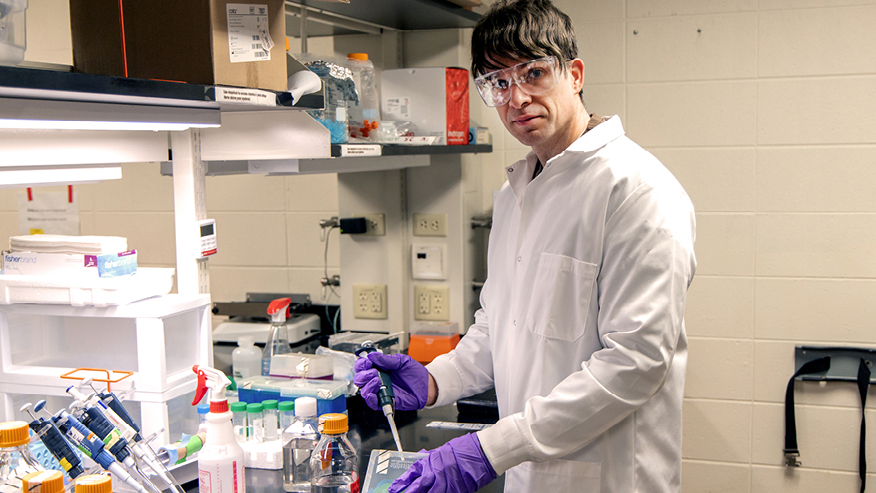Wednesday, April 16, 2025 | Steve Martin
WEST LAFAYETTE, Ind. — Purdue University researchers are developing innovative antibody-based immunotherapies that recruit and improve the function of the body’s innate immune system to treat glioblastoma, an incurable brain tumor.
Sandro Matosevic’s patent-pending work improves upon traditional molecules to recruit and activate natural killer (NK) cells. NK cells are a type of white blood cell that have granules with enzymes to kill tumor cells or virus-infected cells. Matosevic is an associate professor in the Department of Industrial and Molecular Pharmaceutics in Purdue’s College of Pharmacy and on the faculty of the Purdue Institute for Cancer Research and Purdue Institute for Drug Discovery.
“Traditional NK cell engagers, or NKCEs, are antibody-like molecules that bring NK cells and cancer cells in close contact. This stimulates the immune cell to kill the cancer,” he said. “The engagers capitalize on the innate capabilities of NK cells, but NK cells lack efficacy and specificity against glioblastoma and the ability to deeply infiltrate the tumor.”
Unlike traditional NKCEs, Matosevic’s technology recruits immune cells to improve their homing to the tumor and, as an additional function, tethers them to cancer cells. This leads to a significant improvement in efficacy against tumors and a comparative reduction in tumor cell resistance.
“Our NKCEs can be readily manufactured using known reagents and administered off the shelf to patients alongside autologous or allogeneic cell-based products without limitations on clinical use,” Matosevic said.
Matosevic disclosed the innovation to the Purdue Innovates Office of Technology Commercialization, which has applied for a patent to protect the intellectual property. Industry partners interested in developing or commercializing the innovation should contact Joe Kasper, assistant director of business development and licensing — life sciences, at jrkasper@prf.org about track code 70791.
Validation tests and next steps
Matosevic and his team have put the Purdue NKCEs through three critical validation tests.
“First, we tested a number of designs to identify a lead NKCE format,” Matosevic said. “We validated production of the lead engager by protein expression assays, Western blot and SDS-PAGE, followed by initial functional assessments using binding assays.”
After development and production, Matosevic and his team conducted functional assessments of the NKCE.
“During the trial, our NKCE was tested on ex vivo-expanded human NK cells and analyzed for induced cytotoxicity of NK cells against glioblastoma spheroids,” he said. “Our engager was found to significantly enhance the ability of NK cells to kill the spheroids.”
Finally, the engager was tested in vivo in mice models.
“Mice that received the engager treatment survived longer, had better control of their tumors and saw superior intratumoral infiltration of NK cells,” Matosevic said.
Matosevic said the next steps to develop the Purdue NKCE for glioblastoma are to complete Investigational New Drug-enabling studies, which would bring the technology to human trials. These studies are currently underway.
The development of Matosevic’s technology was funded by grants from the Purdue Institute for Cancer Research, the Purdue Research Foundation, the National Institutes of Health and the V Foundation for Cancer Research.
About glioblastoma
Glioblastoma is a brain tumor for which chemotherapy, surgery and most, if not all, immunotherapies don’t work. The current life expectancy after diagnosis has been at 15-18 months for the past three decades.
Matosevic said, “Traditional immunotherapies fail because there are few natural therapeutic immune cells, such as NK cells, in the glioblastoma tumor. The cells that are there tend to be dysfunctional, and current therapies fail to increase their recruitment or function.”
About Purdue Innovates Office of Technology Commercialization
The Purdue Innovates Office of Technology Commercialization operates one of the most comprehensive technology transfer programs among leading research universities in the U.S. Services provided by this office support the economic development initiatives of Purdue University and benefit the university’s academic activities through commercializing, licensing and protecting Purdue intellectual property. In fiscal year 2024, the office reported 145 deals finalized with 224 technologies signed, 466 invention disclosures received, and 290 U.S. and international patents received. The office is managed by the Purdue Research Foundation, a private, nonprofit foundation created to advance the mission of Purdue University. Contact otcip@prf.org for more information.
About Purdue University
Purdue University is a public research university leading with excellence at scale. Ranked among top 10 public universities in the United States, Purdue discovers, disseminates and deploys knowledge with a quality and at a scale second to none. More than 107,000 students study at Purdue across multiple campuses, locations and modalities, including more than 58,000 at our main campus in West Lafayette and Indianapolis. Committed to affordability and accessibility, Purdue’s main campus has frozen tuition 14 years in a row. See how Purdue never stops in the persistent pursuit of the next giant leap — including its comprehensive urban expansion, the Mitch Daniels School of Business, Purdue Computes and the One Health initiative — at https://www.purdue.edu/president/strategic-initiatives.

Sandro Matosevic, a researcher in Purdue University’s College of Pharmacy, is working to treat glioblastoma, an incurable brain tumor, with antibody-based therapies that recruit immune cells and tether them to cancer cells. (Purdue University photo/Jennifer Stewart-Burton)



